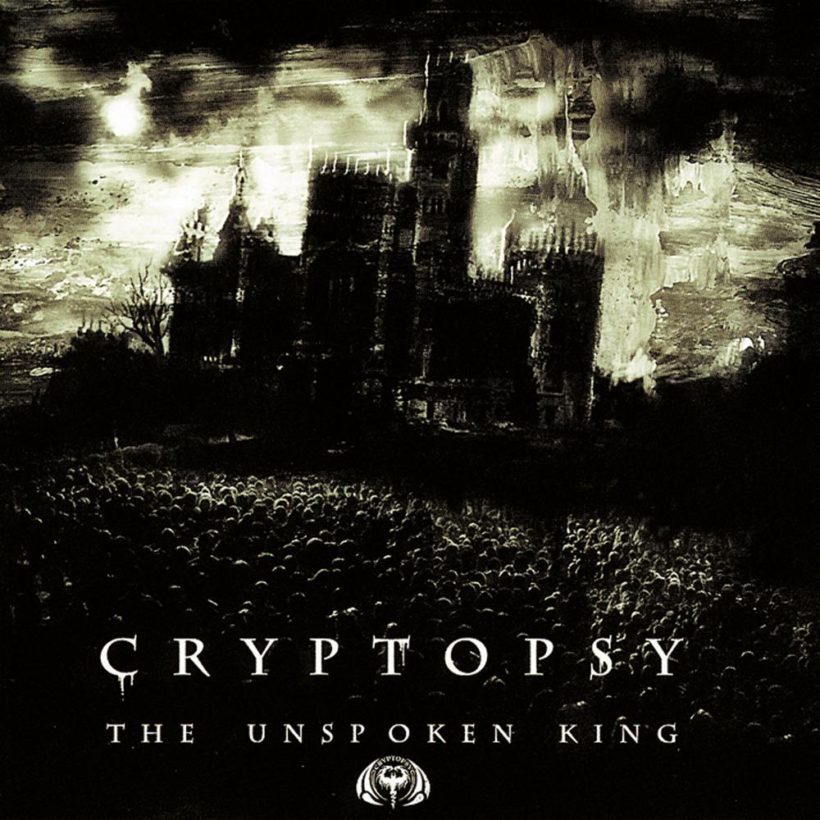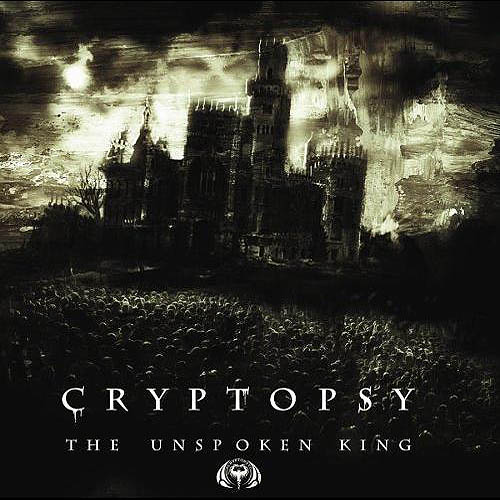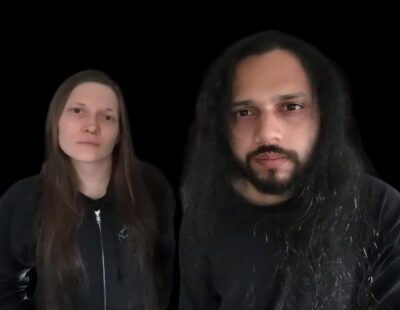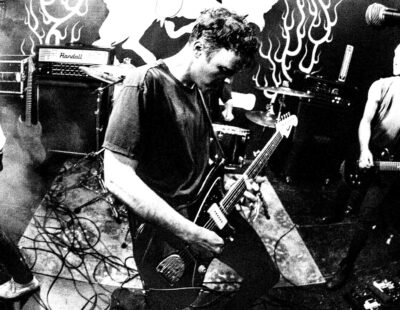
Almost every band has that album: you know, the critically and/or commercially reviled dud in an otherwise passable-to-radical back catalog. Well, every Wednesday morning, a Decibel staffer or special guest will take to the Deciblog to bitch and moan at length as to why everybody’s full of shit and said dud is, in fact, The Shit. Today’s submission: Kevin Stewart-Panko invites the wrath of a million messageboards by defending Cryptopsy’s The Unspoken King.
If we are to apply Señor Begrand’s premise from last week’s JYST that Judas Priest’s Turbo (an album I also quite enjoy, by the way) was in many ways a product of the big hair, big hooks and big-chorused ’80s, and Rob Halford and Co. were simply following that path, whether subconsciously or consciously in 180-degree opposition to the preceding classics that are Screaming for Vengeance and Defenders of the Faith, then a similar process can be applied to The Unspoken King. That it became Cryptopsy’s most polarizing slice of work before it was even available for illegal download, let alone actually released, should be as unsurprising as it is annoying. Think about the small-scale shitstorm these dudes generated amongst the faithful when they brought Mike DiSalvo, his shaved head and enjoyment of hardcore into the fold for Whisper Supremacy. Think about how achingly conservative death metal fans can be on the best of days, and it wouldn’t take much to get all and sundry in a lather and offend senses and sensibilities.
When I was growing up in the late ’70s and early ’80s, a number of prognosticators prognosticated about the inevitability of humans living comfortably on the moon, personal computers being prohibitive to the average person because of their size and cost, and what uses society was going to make of time travel. Well, in case you haven’t been paying attention, no one from this dumb planet has been to the moon since 1972 (assuming there ever really was a moon landing to begin with), there’s a chance you’re reading this on a digital device the size of your penis and our time travel is limited to watching the Back to the Future trilogy. Sadly and pathetically, humankind’s most reliable form of time travel into the past is based on our rickety memories and searchable internet pages that haven’t been deleted or swallowed by cyberspace. And as far as time travel into the future is concerned, that shit is still limited to weathermen making daily predictions with an accuracy rate that continues to hover around 50 percent. But I digress.
Go back two, three or four years. If you read the review section of the magazine that birthed this blog, you’d notice a lot more mentions of the vocal style we coined (twas Bonazelli, if I’m not mistaken [ED. I wish, but it was actually the great Jeff Walker!]) and referred to as “good cop/bad cop.” You know them better as those bands that shifted between clean and harsh vocals, but didn’t do it half as well as Greg Puciato. It was all the rage in certain subgenres that ended with the suffix “-core” and, like anything, some of it was good, some of it was bad. The biggest stumbling block in hindsight is trying to remember which bands did it well, and considering how quickly trends come and go these days, it’s not shocking that I can hardly remember the term being used much throughout 2010’s review section. Nowadays, a good number of deathcore and metalcore bands have picked up on the “good cop/bad cop” folly, with the result being their tending to avoid anything that diverts from the heavier, more brutal side of things. Clean vocals have been eschewed, and now we’re making fun of their haircuts and day-glo merch. But “back then” (geez, it wasn’t that long ago!), clean vocals ran amok, and after playing with their heads down, brows furrowed and teeth gritted since 1992, Cryptopsy felt the need to do something different. They didn’t allow themselves to be completely consumed by what was going on around them, but allowed themselves to be influenced just enough by the world outside of death metal, and that shit is bound to piss people off.

The first sign that The Unspoken King wasn’t going to fall into line with previous works was when, after longtime vocalist Lord Worm quit (because teaching English pays the bills better than snacking on worms in dingy bars), Cryptopsy reached out with a “help wanted” notice, looking for someone with vocal diversity and clean signing skills to replace ol’ Dan Greening (if memory serves, their hunt also included someone to handle keyboards and samples, though considering the negligible amount of those elements on the album, and that Maggie Durand only lasted in the band long enough to get her photo taken, let’s forget about that). Actually, the real first sign things were going to be different came on previous album Once Was Not. You don’t even have to listen carefully to a track like “Pestilence That Walketh in Darkness” to hear the band making melodic overtures while Mr. Worm continued to be Mr. Worm. In an interview during the period The Unspoken King was being mixed, I remember drummer Florent “Flo” Mounier saying they wanted to try something a little different; they’d proven themselves as a death metal entity over the years and wanted to exploit the vocal range of then-new guy Matt McGachy.
There was quite a hoo-hah raised after the band previewed “Bemoan the Martyr” online. Commentators were pissed that DiSalvo wasn’t jabbing and roundhousing his voicebox into a soupy mulch, Greening wasn’t growling and grinding his vocal cords into a wormy stew, the melodic passages of Once Was Not appeared with more prominence and clean vocals were being utilized, transforming a band some people felt some amount of ownership of (which is fodder for another essay altogether). A lot of folks apparently didn’t want to bother looking beyond that one song as, looking back at board threads from the time—remember, our rickety time machine—many already threw the band and the album under the bus based on that one song. If we’re being honest, “Bemoan the Martyr” uses those uncharacteristic clean vocals and a massive power chord progression sounding like Shadows Fall-meets-Deftones to bookend what one would expect from the band. Sure, once the album was released, it became obvious that “Bemoan” wasn’t the only song to make use of McGachy’s clean voice, to varying degrees of success, but those for those with short attention spans who like to prejudge, this album was doomed from the start. In reality, though, it’s pretty good. Even the parts with the clean singing.
First song “Worship Your Demons” is about as good a Cryptopsy album opener as there ever has been. It’s surprisingly catchy without sacrificing any technicality, though being recorded by the band themselves, the dominance of the drums doesn’t help in dispelling the specious opinion that, after almost two decades, Cryptopsy have become more a vehicle for Mounier to show off his talents while hawking wares related to those talents like custom drum sticks, instructional DVDs and whatnot. Nevertheless, the song rules and, in these eyes, is one of the band’s best. Ever. That’s right, skippy. “The Headsman” continues along in the high-speed tech-death passing lane the band has been occupying since the early ’90s. I still fail to understand the logic of that song’s mid-section break/pause, though the brief solo and super-fast outro riff/drum pattern gives the cognitive dissonance-loving part of my brain a big, juicy woody. “Silence the Tyrants” sports a wealth of absolutely killer riffs (especially the one that starts at 1:28), a goth-y mid-section that resolves itself with a part-classic Metallica, part-O.C. metallic hardcore micro-sequence before going back to the stuff that makes mainstream music fans and musicians refer to the music we love as noise. Then, after all this above-average racket, it begins.
“Bemoan the Martyr” is next and, like I said, McGachy bookends some pretty chaotic and sinewy death metal. “Leach” throws some eyebrow-arching baritone into the middle of a song otherwise based on fiery chromatics, deliriously shifting chord progressions, Mounier’s always frantic drumming and more warm ‘n’ spazzy leads. “The Plagued” mimics the bookended “Bemoan” except that the death metal part of the song sounds like each member downed a case of energy drink before recording, and when McGachy does sing, it works best in terms of where and how it’s placed. A damn fine track! However, when they conclude the typical Cryptopsy of “Born Dead” with more singing and an anthemic, almost modern-rock chord workout, it seems more tacked-on than natural or flowing.
The Unspoken King runs for 47 minutes, and if you sit down and time the amount of time the band spend utilizing McGachy’s clean vocals (which I did at the time!), it clocks in somewhere in the neighborhood of six of those 47 minutes. The rest continues the sort of spirited lightspeed splashes of tech-death calisthenics usually associated with the Cryptopsy name. The elements that had steam coming out of the ears of old-school fans and new-school complainers actually give the album a much-needed dynamic discourse, allowing the more brutal material to have more impact when placed alongside those sections that aren’t as ferocious. The one thing that The Unspoken King has that lacks on previous works is a strong sense of anticipation, tension and release. The album ebbs and flows in terms of tempo, explosiveness, rage, musicianship and an extreme disparity of sounds. Thus, it’s 11 songs a set of ears that has heard straight-ahead tech metal reach its breaking point time and again will welcome time and again, because those ears already own and have listened to …And Then You’ll Beg a few hundred times. And those ears belong to yours truly. —Kevin Stewart-Panko
Tracklist:
1. “Worship Your Demons”
2. “The Headsmen”
3. “Silence the Tyrants”
4. “Bemoan the Martyr”
5. “Leach”
6. “The Plagued”
7. “Resurgence of an Empire”
8. “Anoint the Dead”
9. “Contemplate Regicide”
10. “Bound Dead”
11. “(Exit) the Few”






